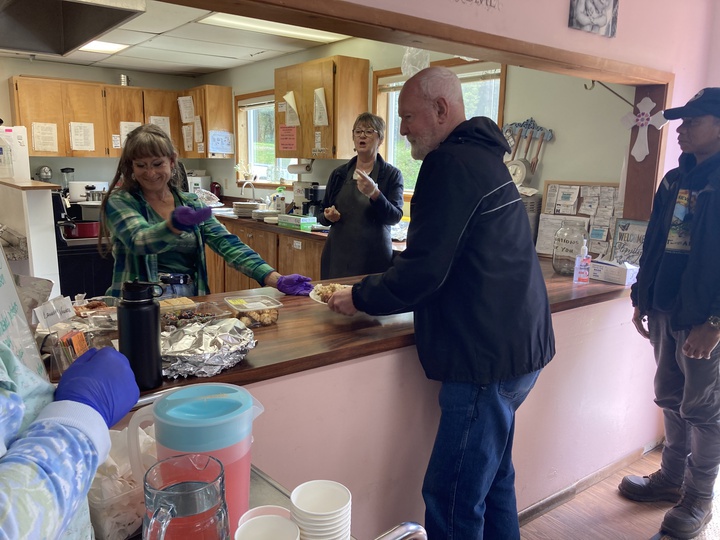Jessica Cejnar Andrews / Friday, July 7, 2023 @ 3:33 p.m. / Community, Homelessness, Local Government, Oregon
St. Tim's Gets Reprieve As Brookings Planning Commissioners Review Arguments; Concern Over Church's Outreach Program to be Reconsidered Aug. 1

Jay Lindsay gets lunch from Smith River United Methodist Church volunteers at St. Timothy's Episcopal Church in this May 8 photo. | File photo: Jessica C. Andrews
Previously:
• Volunteers Keep Feeding The Hungry At St. Tim's, Despite Brookings Abatement Notice
• Brookings Serves Abatement Notice to St. Timothy's, Stating Public Safety Problems Remain
###
An appeal from St. Timothy Episcopal Church against a City of Brookings threat to fine the church for its community outreach has reached planning commissioners.
Though about 15 people spoke out in support of the church at the Planning Commission’s June 27 meeting, according to KCIW News Director Lori Gallo-Stoddard, who attended the meeting, the Planning Commission tabled the matter until Aug. 1.
According to Gallo-Stoddard, one planning commissioner, Skip Hunter, recused himself since he had volunteered with the church previously.
St. Timothy’s pastor, Reverend Bernie Lindley, said he’s grateful for the reprieve. Brookings isn’t assessing fines against the church until the appeals process is concluded, he told the Wild Rivers Outpost on Friday.
“We submitted a lot of written testimony. There is no way they had time to read it all,” Lindley said. “We requested additional time so the planning commissioners would be able to look at all the stuff we had submitted. We didn’t want them to make a snap decision that night.”
According to Brookings City Manager Janell Howard, the Planning Commission granted St. Timothy’s an additional seven days to submit written arguments. She confirmed Friday that city isn’t currently assessing daily fines against the church.
Brookings issued an abatement notice on April 14, threatening to fine St. Timothy’s up to $720 per day for operating a “benevolent meal service” without a conditional use permit.
The city also takes issue with St. Timothy’s day program, which includes offering showers to the needy as well as a place for them to charge their phones and access the Internet. The church also offers access to legal aid and other services, which the city says is not allowed in a residential area.
The church’s “benevolent meal service” consists of a four-day-a-week soup kitchen with one day hosted by the Smith River United Methodist Church. That issue is already being litigated in federal court, which has prompted the city to temporarily suspend abatement proceedings, according to the Planning Commission’s June 27 staff report.
“They can’t start fining us on something that’s currently being litigated,” Lindley said.
In its April 24 appeal letter to the city, St. Timothy argues that its day program and legal aid services are a church’s typical function.
According to the city’s June 27 staff report, St. Timothy’s representatives cited news articles and websites focusing on different services churches offer nationwide, though city officials state it isn’t “apparent” that they are in residential areas.
In its staff report, the city cited the Merriam-Webster and Oxford English dictionaries, stating that a church is a building used for “public and especially Christian worship.”
“Both of these definitions only refer to ‘worship,’ not any other religious activities,” the city’s staff report states. “The city is not aware of any information suggesting that when people are seeking and obtaining social services at St. Timothy’s there is any worship/religious service being performed. The only worship or religious service at St. Timothy’s occurs on Wednesdays from 12-12:45 p.m. and Sundays from 10-11:30 a.m. The church has not provided adequate evidence to show that these activities are ‘typical’ functions conducted by churches and are considered part of a church use.”
St. Timothy’s was operating before the Brookings City Council in 1989 adopted its land development ordinance. It was also granted a conditional use permit in 1999 to make a minor change to the building, according to the city’s staff report.
However, the city contends that the church hasn’t met its burden of proof that it’s offered services to the needy since 1989 since Lindley told the city St. Timothy’s advocacy program began in about 2018.
But, Lindley pointed out, alms isn’t limited to money.
“Every parish should have an alms fund, and for decades we’ve been distributing alms typically in the form of rental assistance and utilities, but as needs change so does our alms giving,” he said. “When somebody takes a shower, that’s a form of alms because alms isn’t limited to just money.”
According to Lindley, the church’s federal lawsuit against Brookings is nearing the end of the discovery phase. St. Timothy filed its suit in January 2022, about three months after the Brookings City Council approved restricting the number of days churches can feed the hungry to two.
In its lawsuit, the church claims that Brookings’ ordinance violates its First Amendment rights.
CLICK TO MANAGE